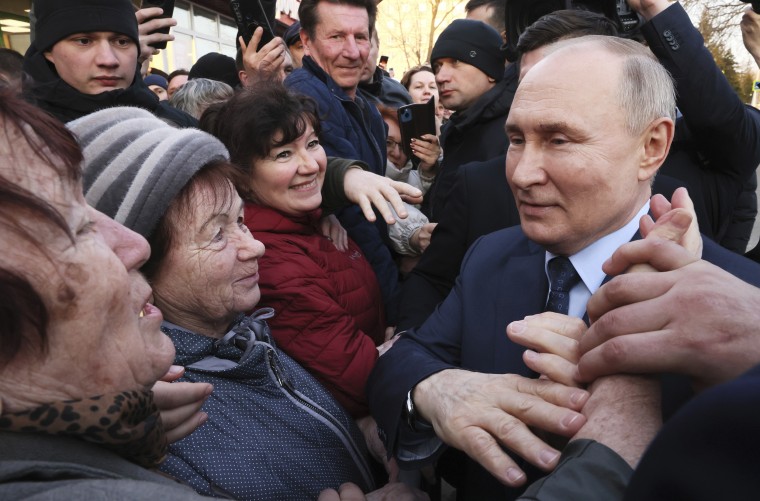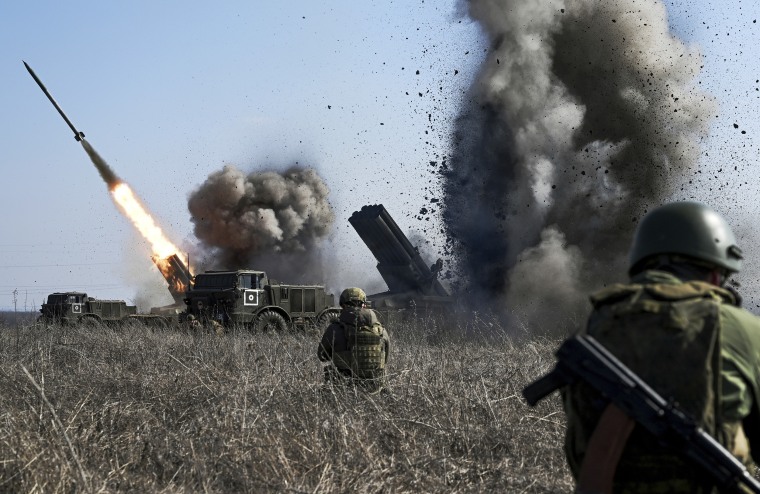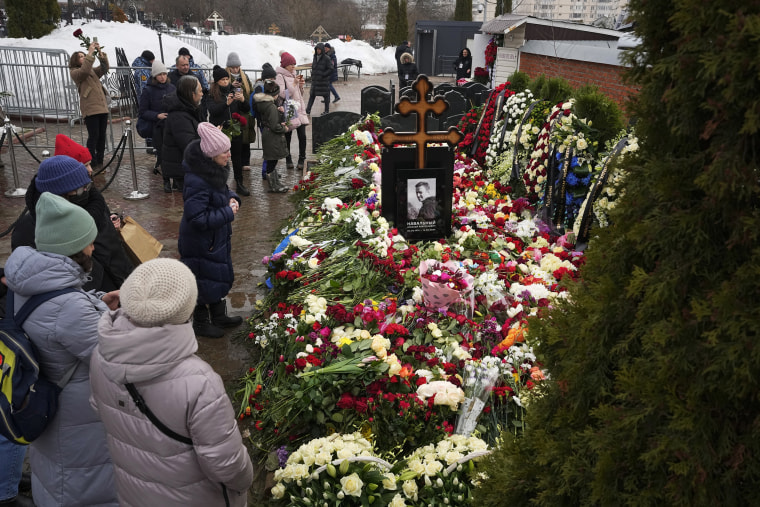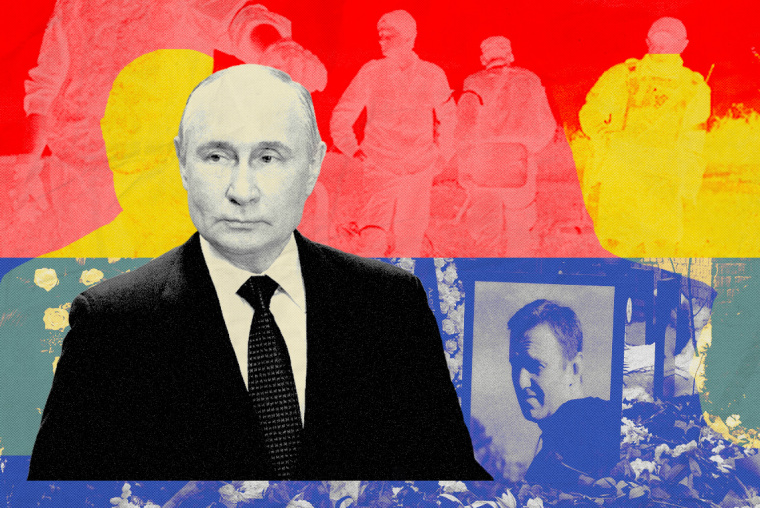President Vladimir Putin‘s rule over Russia, set to be extended in an effectively uncontested election over the next few days, has never been more total — from the Arctic penal colony where the man who posed the greatest challenge to that rule died, to the field north of Moscow where a rebellious mercenary chief was killed in a fiery plane crash.
Putin will begin another six years in power with his domestic opponents either dead, jailed or exiled. His war in Ukraine has recast life at home and intensified a clash with the West now shadowed by the uncertainty of America’s own election. Russia’s military is advancing on the battlefield and its economy has shown surprising resilience in the face of global sanctions.
The victory orchestrated by the Kremlin, however, will bely signs of fragility behind that choreographed show.
Despite an atmosphere of repression not seen since the Soviet era, there have been sprouts of internal dissent and external attacks ahead of the election that have pierced the picture of unity and stability the Kremlin has cultivated.
“The results have been announced in advance,” said Nikolai Rybakov, chairman of Russia’s liberal political party Yabloko, which decided not to join the race this year. “It’s painful, unpleasant and shameful but you have to admit that you can’t influence the results right now,” he said in a phone interview from Moscow this week.
“We see that people have an internal demand for peace and changes for the better. But it’s hard for people to resist the ever-present propaganda of hate and anti-Westernism. And on the other hand, people see what criticism of the government can lead to,” he added. “People are afraid for their lives and the lives of their loved ones, and you can’t blame them.”
War and repression
Six years ago, Putin’s victory in the 2018 election was also a foregone conclusion. But his army was not waging a brutal full-scale war across the border, opposition leader Alexei Navalny was still a free man investigating official corruption, some independent press could still operate inside the country and Russia was preparing to welcome the world for the men’s soccer World Cup.
Back then, Putin’s regime was repressive but more wary of how it was perceived. The invasion of Ukraine in February 2022 has changed that.
But Putin appears to be in a stronger position than at any point in his 24 years in power.
His approval rating remains high at 86%, with 76% of Russians supporting his war in Ukraine, according to the independent pollster Levada Center.
Of course gauging public opinion is difficult in Russia, with relentless propaganda boosting the Kremlin’s narrative and people often too afraid to speak freely.
Perhaps one crucial factor is that the country’s economy has largely weathered international sanctions.
Western brands have been replaced by Russian ones, and closer ties with Asia, particularly China, have helped fill some gaps.
Inflation is higher than 7%, meaning that prices have soared for some everyday goods — including eggs, leading to a high-profile shortage that forced Kremlin intervention. But official statistics show wages are rising and, in general, there has been little economically to shake Russians from their everyday lives.

There is no one to oppose Putin on the ballot anyway. Russia’s opposition has been decimated, with Navalny’s death last month just the latest devastating blow.
“The political field has been cleared out,” Yekaterina Duntsova, a former regional legislator and journalist who tried running for president this year, told NBC News.
“Fundamentally, the country has changed for the worse in the last six years,” she said in a phone interview from Moscow earlier this month. She was one of two candidates with an anti-war message barred from running against Putin, while three Kremlin-approved candidates will be on the ballot alongside the Russian leader.
“People live in a state of aggression — finding out who is for and who is against, looking for some virtual enemies and the fifth column,” Duntsova said.
Russian elites with anti-war views have been forced into exile, and those remaining in Russia have been kept in check. Independent media fled the country, and any form of protest has become impossible without risking arrest.
History textbooks have been altered to extol the virtues of the war, basic military training is now part of the curriculum for high school seniors, and public spaces are filled with posters summoning Russian men to join the army. The so-called “Western values” of freedom of expression and respect for human rights have been banished, resulting in the outlawing of the LGTBQ+ “movement” and persecution of human rights advocates.
Politically motivated arrests and the detention of foreigners, including Americans, are also becoming routine.
“Russian society is at a point right now where it’s experiencing the largest scale of political repressions — particularly for expressing one’s opinion or exercising one’s rights and freedoms,” said Denis Shedov, a board member for the Memorial Human Rights Defense Center, heir to the human rights group Memorial, which was shut down in Russia in late 2021. “We have not seen the likes of this in the history of modern Russia.”
What changed over the last six years is that many Russians now live with a “palpable fear and anxiety” about repression, he said, unclear about what actions or mere words could land them in trouble.
That has spiraled out of control since the war started, Shedov said. His organization has documented the cases of 682 political prisoners, but that number is likely much greater, he said, as limited resources mean that his colleagues sometimes “can’t keep up with reality.”
Diplomacy and dissent
Putin’s standing has been evident on the global stage in recent weeks, too.
He has renewed his nuclear saber-rattling and repeatedly inserted himself into the U.S. election campaign, exploiting splits in the Western alliance that may be amplified by the return of former President Donald Trump.
Putin has stated his preference for President Joe Biden to remain in the White House, a mischievous intervention that may hint at his confidence in the geopolitical winds.
The Kremlin’s military has been advancing on the battlefield in Ukraine, taking advantage of stalled U.S. aid and Kyiv’s dire shortages of soldiers.

But he has not had it all his own way.
Less than a year ago, the Russian leader faced the gravest challenge to his rule, in the shape of Wagner mercenary chief Yevgeny Prigozhin. And while he saw off that short-lived mutiny, it was a sign of the unpredictable forces that the war in Ukraine has unleashed.
For all his army’s recent progress, Putin has fallen far short of his hopes for a rapid campaign that would force Ukraine’s capitulation. Instead, two years in, Russian border towns and villages are frequently targeted by Ukrainian shelling and even incursions by anti-Kremlin fighters. Deeper into Russia, the country’s energy infrastructure has faced the dual threat of a growing wave of Ukrainian drone attacks and its own Soviet-era frailties, which caused a utilities collapse this winter.
And while Putin has tried to keep the war a distant concept for the public, the attritional fight has fueled anger from an unexpected source.
The wives of men mobilized to fight in Ukraine have publicly called him out for failing to return their loved ones home and end the war, wielding white scarves and flowers in protest. They have now called on Russians to spoil their ballots because they say no candidate has answered their pleas.
This simmering sentiment led two people with an anti-war message to emerge during the election cycle. Duntsova was rapidly barred, but seasoned politician Boris Nadezhdin drew people from across Russia to line up and give their signatures in support of his anti-war candidacy. He was swiftly barred, too.
And the Kremlin’s narrative was further muddied by the thousands of people who turned out for Navalny’s funeral, or lined up for days to pay their respects at his grave despite warnings from authorities.

His wife and potential successor as opposition leader, Yulia Navalnaya, urged the West in an op-ed this week to not recognize Putin as the legitimate president, which she said would send an important signal to Russian society and elites still loyal to the Kremlin.
But any pressure from outside has done little to stop Putin from crafting a Russia that is increasingly his.
“We want to hope for the best,” Duntsova said. “But we prepare for the worst.”

